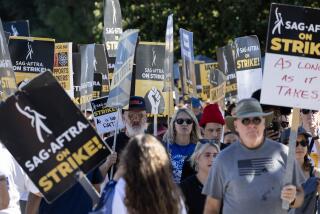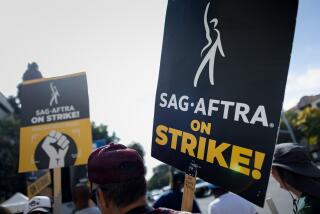Tobacco Firms Offer Sweeping Concessions
- Share via
Eager to buy peace in the smoking wars, the tobacco companies have offered to fund an antismoking campaign of unprecedented size and to make sweeping changes in their marketing practices as part of a settlement of tobacco litigation.
But key obstacles threaten to derail the settlement talks, including the issue of imposing politically acceptable limits on future suits by sick smokers, according to people involved in the talks.
As secret negotiations enter their second month with talks set for Monday in Dallas, the once-defiant industry has offered concessions that would have seemed unimaginable just a few weeks ago, say negotiators and longtime industry observers.
There has been a “sea change” in the industry’s posture, said one participant, who spoke on condition of anonymity. The companies have agreed “to programs that say, ‘Don’t buy our product.’ ”
Although a federal judge last week struck down portions of new Food and Drug Administration rules meant to curb advertising targeted at youth, industry negotiators have offered to accept and go well beyond the FDA measures in their talks with state attorneys general and private antitobacco lawyers.
For example, while the FDA sought to ban billboards within 1,000 feet of schools, the industry has offered to halt all outdoor advertising, including banning billboards and signs in store windows and sports venues.
In addition, say people involved in the talks, the industry has offered to:
* Cease using human figures, such as the Marlboro Man, and cartoon characters, such as Joe Camel, in print advertising.
* Ban vending-machine sales of tobacco.
* Spend up to $1 billion per year on antismoking media campaigns.
* Fund a government program to license tobacco retailers and penalize those who sell cigarettes or smokeless tobacco to youths under 18.
These initiatives would be paid for out of a settlement fund of perhaps $250 billion to $300 billion, to be raised over a 25-year period through large hikes in the price of tobacco.
*
The settlement fund also would be used to reimburse states for Medicaid funds spent to treat sick smokers and to settle a host of statewide class-action lawsuits filed by a nationwide alliance of private lawyers.
But little, if any, money would be left for future claims by individual smokers, say participants in the talks. And the right of those people to sue--along with the $50-billion-a-year industry’s thirst to cap their liabilities--has emerged as the leading obstacle to a deal.
With more than 40 million current smokers, potential claimants could overwhelm the settlement fund, said one participant in the talks.
“If you’re going to give them much beyond $1.50 apiece, how do you do it?” the lawyer asked. “They don’t print enough money” for every smoker who may file a claim.
Thus, smokers still would sue to have any hope for meaningful compensation. Yet without some protection from such suits, the industry would have little cause to settle, one participant said.
Reports last month that the companies were seeking blanket immunity from future lawsuits drew howls of protest from congressional critics and antismoking groups. President Clinton and White House Deputy Counsel Bruce R. Lindsey, who is closely monitoring the talks, declared that complete immunity for the industry was out of the question.
But any reduction in smokers’ right to sue would require approval of Congress and the White House in the form of legislation. And it remains uncertain what limits would be deemed politically acceptable while granting tobacco some protection.
A cap on damage awards has been mentioned as a possible solution. But negotiators said this week that they do not yet have an answer and that the issue remains a potential deal-breaker.
“If we can’t get through issues like liability, there’s no use in our continuing to talk,” said Washington Atty. Gen. Christine Gregoire, one of the lead negotiators for the attorneys general with suits against the industry.
On Friday in Chicago, leaders of the nation’s leading public health organizations, including the American Cancer Society, the American Heart Assn., the American Lung Assn. and the American Medical Assn.--adopted a set of core principles regarding the smoking negotiations that includes strong opposition to granting the industry immunity, according to people who attended the meeting. Indeed, the chief executive of the lung association introduced himself as John “No Immunity” Garrison.
A related sticking point involves the insistence that the industry admit, as part of any settlement, that smoking is addictive and deadly.
The tobacco companies face a long-running criminal probe by the Justice Department into allegations that they deliberately misled the public and government agencies about the hazards and addictiveness of smoking.
Allegations that the companies deliberately lied about the dangers of smoking are also central to every civil lawsuit against them. With the legal actions hanging over them, admitting they knew of smoking’s dangers would be fatal.
This issue, too, “is totally unresolved at this moment,” Arizona Atty. Gen. Grant Woods told The Times. “Obviously, the companies will be reluctant to make admissions that can be used against them” in lawsuits or criminal cases, Woods said.
Some participants in the talks believe that a deal will be struck within three to four weeks, or the talks will collapse. Any deal would require congressional approval, which almost certainly could not come before the scheduled start of huge Medicaid trials in Mississippi and Florida this summer.
*
As the talks have progressed, differences have emerged within both camps. One anti-tobacco lawyer involved in the talks admitted having mixed emotions about favorable legal developments that might stiffen colleagues’ bargaining position.
“They [the tobacco companies] have their radicals, [and] we have our radicals,” he said. With each victory, “my team wants to keep moving the goal posts back. And how far is tobacco going to keep following the goal posts?” he asked.
On the other hand, Minnesota Atty. Gen. Hubert H. Humphrey III has frequently raised questions about a deal.
On Friday, he sent a letter to the other attorneys general urging them not to “rush into a settlement of the biggest public health issue of our time.” His letter stressed that until there is broader understanding and consensus on key issues, “no one can or should suggest that settlement of Minnesota’s lawsuit is a probable outcome of the negotiating process currently underway.” He also said the proposed $300-billion settlement fund was inadequate.
More to Read
Sign up for Essential California
The most important California stories and recommendations in your inbox every morning.
You may occasionally receive promotional content from the Los Angeles Times.










